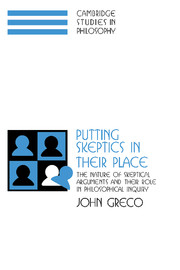 Putting Skeptics in their Place
Putting Skeptics in their Place Book contents
- Frontmatter
- Contents
- Preface
- 1 The Nature of Skeptical Arguments and Their Role in Philosophical Inquiry
- 2 Skepticism about the World: Part One – Reconstructions
- 3 Skepticism about the World: Part Two – Dismissive Responses
- 4 Skepticism about the World: Part Three – Dualism, Realism, and Representationalism
- 5 The Argument from an Infinite Regress of Reasons
- 6 Hume's Skepticism about Unobserved Matters of Fact
- 7 Agent Reliabilism
- 8 Agent Reliabilism and the Relevant Sense of “Relevant Possibility”
- 9 Moral and Religious Epistemology
- Bibliography
- Index
1 - The Nature of Skeptical Arguments and Their Role in Philosophical Inquiry
Published online by Cambridge University Press: 03 November 2009
- Frontmatter
- Contents
- Preface
- 1 The Nature of Skeptical Arguments and Their Role in Philosophical Inquiry
- 2 Skepticism about the World: Part One – Reconstructions
- 3 Skepticism about the World: Part Two – Dismissive Responses
- 4 Skepticism about the World: Part Three – Dualism, Realism, and Representationalism
- 5 The Argument from an Infinite Regress of Reasons
- 6 Hume's Skepticism about Unobserved Matters of Fact
- 7 Agent Reliabilism
- 8 Agent Reliabilism and the Relevant Sense of “Relevant Possibility”
- 9 Moral and Religious Epistemology
- Bibliography
- Index
Summary
This book has three major theses: (1) that a number of historically prominent skeptical arguments make no obvious mistake and therefore cannot be easily dismissed; (2) that the analysis of skeptical arguments is philosophically useful and important and should therefore have a central place in the methodology of philosophy, particularly in the methodology of epistemology; and (3) that taking skeptical arguments seriously requires us to adopt an externalist, reliabilist epistemology. More specifically, it motivates a position that I call “agent reliabilism,” which is an externalist version of virtue epistemology.
If these theses are correct, then many philosophers have misunderstood the nature of skeptical arguments and their role in philosophical inquiry. For example, many philosophers think that skepticism poses no philosophically interesting problem. According to this view, skeptical arguments rest on some obvious mistake, such as a quest for absolute certainty or a demand for immutable foundations, and can therefore easily be dismissed. Others think that skepticism rests on a substantive philosophical mistake, but that skeptical arguments teach no epistemological lessons. For example, many philosophers think that skepticism is rooted in a bad ontology. On this view skeptical arguments assume an ontological dualism between knowing mind and material object of knowledge and can therefore be rejected by rejecting the offending dualism. Others have thought that skepticism is rooted in representationalism, and still others that it is rooted in realism. Finally, some philosophers have appreciated that skepticism is indeed an epistemological problem, but have tried to solve it by remaining within a traditional, internalist epistemology.
- Type
- Chapter
- Information
- Putting Skeptics in their PlaceThe Nature of Skeptical Arguments and their Role in Philosophical Inquiry, pp. 1 - 24Publisher: Cambridge University PressPrint publication year: 2000


